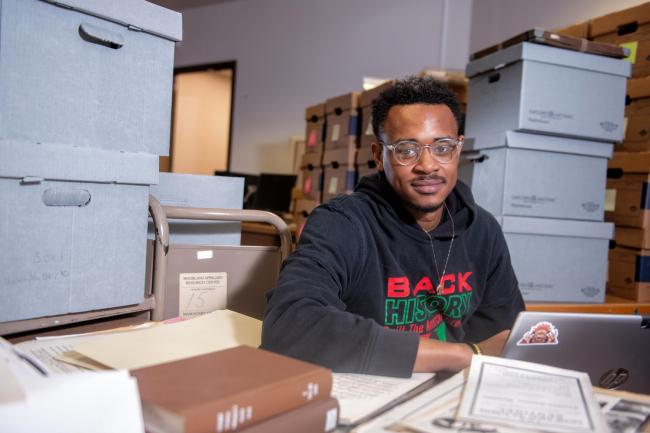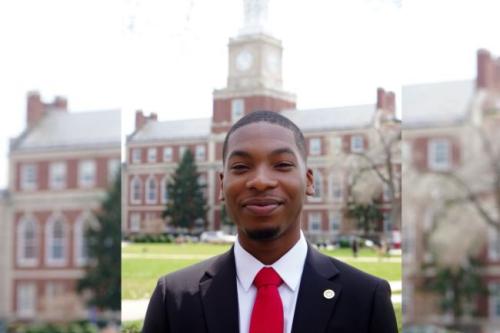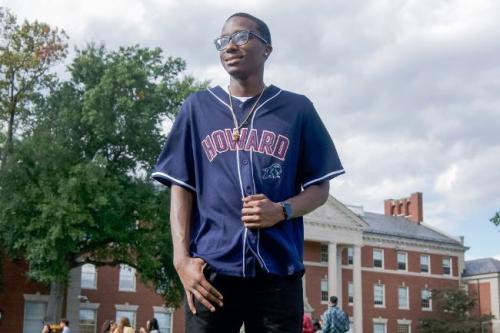Junious Whitaker IV is a first-year master’s/PhD candidate of history from Raleigh, North Carolina who also works at the Moorland-Spingarn Research Center. His research focus is on African American history and the African diaspora, with interest in the impact of Black scientists on the Black experience; the ramification of bills that outlaw critical race theory; and unique cultural areas such as hip hop and other urbanized outlets as a form of oral history internationally (he has found links between what he’s studying in class and what artists such as Kasim, Eleven9, Zeddy, are providing as historical narrative). He believes that music and other areas are modern ways to record and share history, particularly in a pandemic where resources like libraries and traditional ways of reading and writing were limited.
Q: What are you doing at the Moorland-Spingarn Research Center?
A: I worked with the Black Lives Matter protest collection, and right now I'm working with a roller skating project that highlights how roller skating exists in all different types of Black communities and how it’s sort of a form of expression with a rich history behind it. I spend my time doing a lot of different research on different aspects of Black history, absorbing all the knowledge that we have here. Being that Moorland-Spingarn is, I would say, the largest collection of African diaspora artifacts and historical data that I have ever seen.
Q: Why is it important to back up history, to maintain these artifacts and data?
A: History can repeat itself, but we can't know it repeats itself until we know what happened first. I think one of the most important things with history is that you have to be your own orator in a way, or at least contribute to your own story. If you don't contribute your own story, you can’t determine how it is told. Especially in current society right now, with bills like House Bill 3979 and House Bill 324, which outlaws the comprehension of critical race theory and seeks to omit the African American narrative. Growing up in North Carolina, I always found myself in situations where Black history was being told improperly or not at all, so it’s disheartening that it's being legally mandated. This is why it’s important for more people to get involved with Black history and take intimate time to comprehend it. It is important to realize that to understand history, you have to be very much involved. You have to not only be a listener, but you also have to be action based. You have to do more research and garnish more exposure for it while also making sure that you are adhering to people who have done it before.
Q: Why is it then important to have a month like Black History Month, when one could say that every day is Black history?
A: I think that Black History Month, even though it is one of the shortest months of the year, still helps get exposure because it allows people to have an understanding or even an introduction to history that they might not have. It also gets international exposure on topics related to Black history and the contributions of black people that are not usually talked about. I think it's so interesting because if it's not talked about, then it probably will never be talked about. The reality is that Black History was equivocal to the creation of this country but is often deemed societally unimportant. Through Black clothing brands like UL, Legacy History Pride (LHP), Victimized Suspect and others, Black history is still constantly being celebrated throughout the year but they deserve more exposure and so does the history that they broadcasting on their threads. Hopefully one day it truly will be all year long.
Q: History can often be recorded with a lot of room for interpretation, or to be rewritten. How do you ensure that it is recorded as accurately as possible? Why is that important?
A: As I said before, history repeats itself. So if it's not recorded accurately, we can't know how to develop a solution so it doesn't happen again. When history is not reported accurately, it can be detrimental for society. When looking at civilizations, ancient Egypt is always misconstrued. Not just Ancient Egypt, but the Moors, the life of Mansa Musa, and the horrific pillaging that has been generationally done to the paradise that the entirety of Africa. It is very important to record history accurately, because without that accuracy, it can't really have an established base of authenticity nor be academically respected or comprehended.
Q: You said before that if history isn’t talked about, it will never be. So what are some fun facts you recently learned related to Black history?
A: The stoplight was invented by an African American named Garrett Morgan. Hiram Revels was the first Black senator in 1870. He’s actually from North Carolina, and I’m from Southeast Raleigh, North Carolina. The Massachusetts 54th Regiment was the first all-Black infantry unit to fight in the Civil War. They also had a raid on Fort Sumner, which also helped the Union Army eventually win the war. I also found out that William Tucker was the first Black child born in America, and one of my closest friends is actually related to him.





